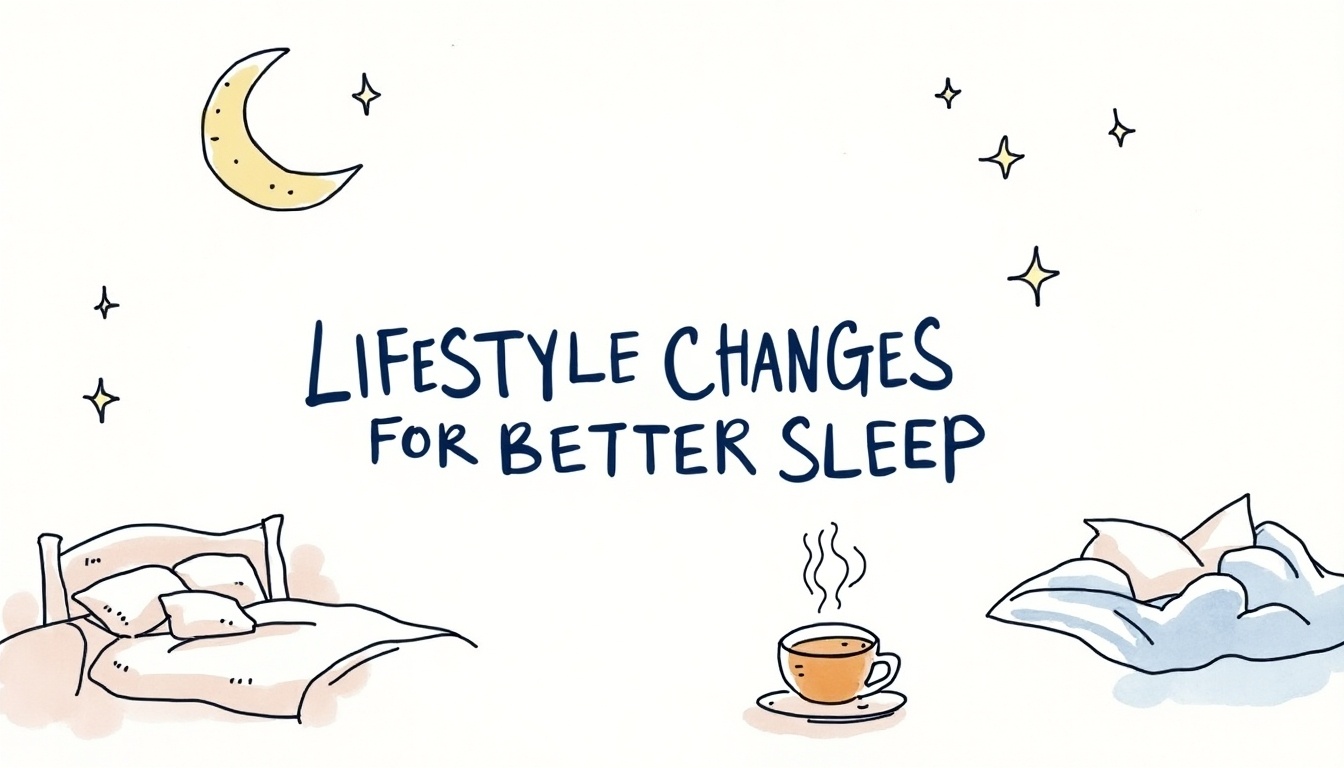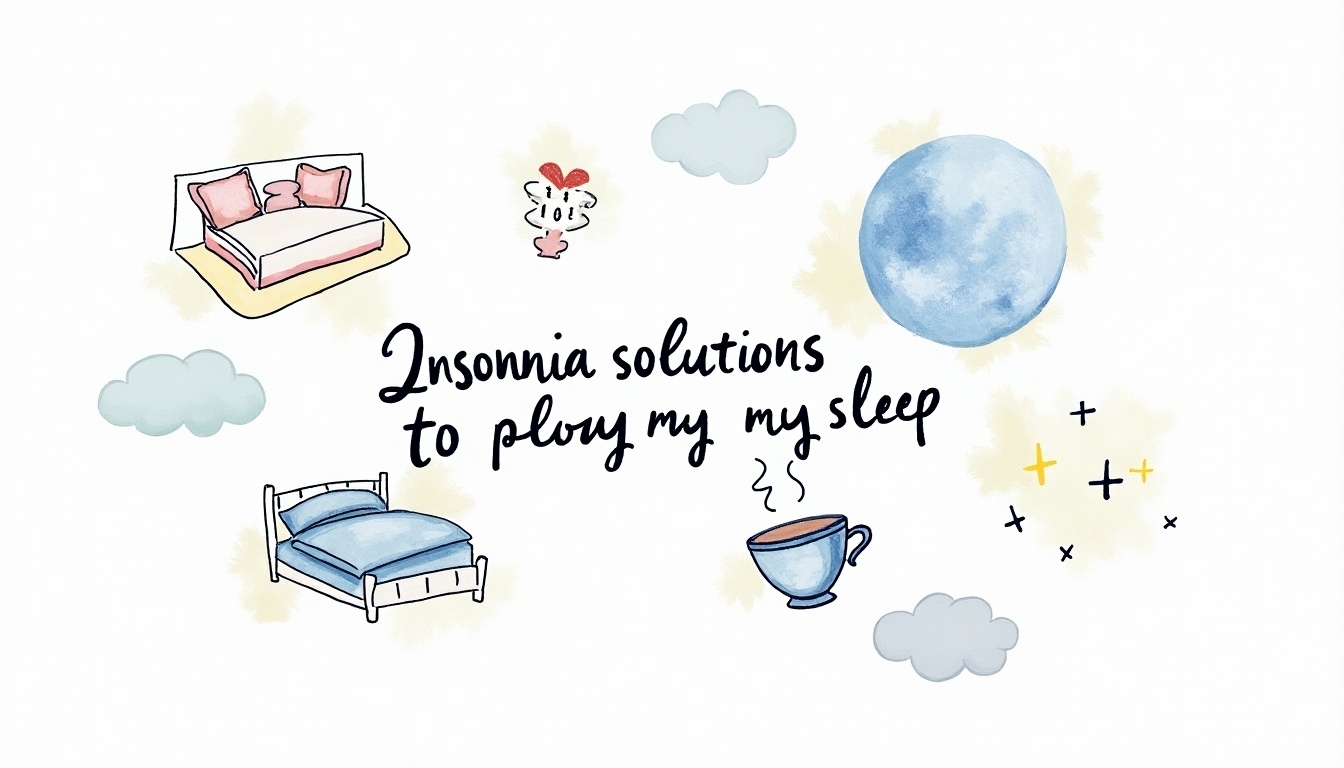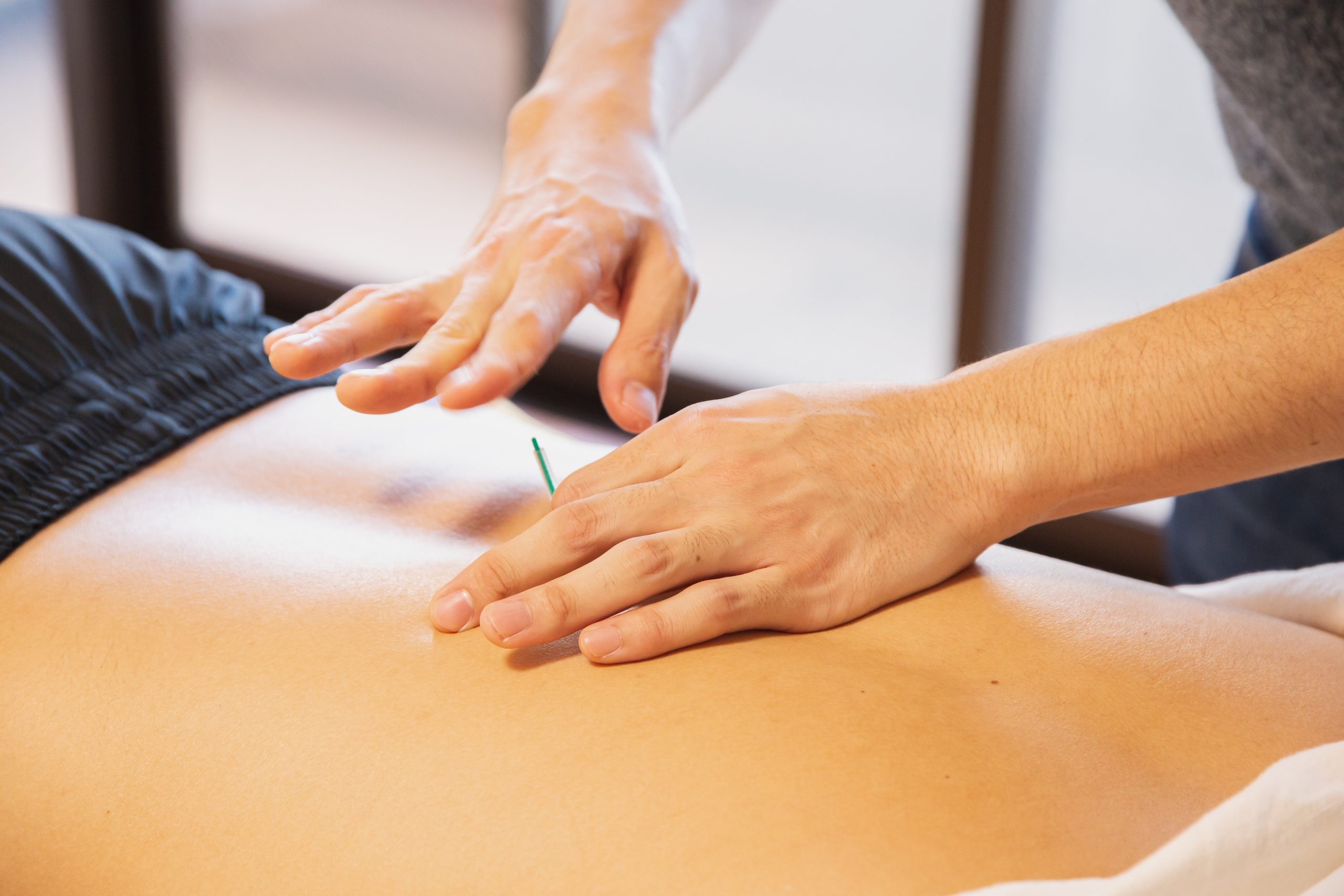Essential Lifestyle Changes for Better Sleep Management
Achieving better sleep often starts with some essential lifestyle changes. First, investing in a well-supporting mattress and comfortable bedding can greatly enhance your sleep experience. Next, blocking out light using blackout curtains or masks will help regulate your circadian rhythm, while minimizing noise with earplugs or white noise machines creates a peaceful environment.
Keeping your room between 65 to 68 degrees Fahrenheit is also key for comfort. Aim for at least seven hours of sleep each night and maintain consistent wake-up times. Engaging in relaxing activities before bed and disconnecting from devices helps calm the mind, leading to healthier sleep patterns over time.
Invest in a Better Mattress & Bedding

A good night’s sleep starts with the right mattress and bedding.
When choosing a mattress, consider factors such as firmness and support.
If you often wake up with back pain, a medium-firm mattress may provide the necessary support to align your spine.
Also, the type of bedding you select can greatly affect your comfort.
Opt for breathable fabrics like cotton or bamboo that help regulate body temperature throughout the night.
This is especially important if you tend to feel too hot or too cold while sleeping.
Investing in high-quality pillows that cater to your sleeping position—whether you sleep on your back, side, or stomach—can also enhance your overall sleep quality.
Block Out Light for Better Sleep
Light exposure can significantly impact your ability to fall asleep and stay asleep.
To create an optimal sleep environment, consider investing in blackout curtains that effectively prevent outside light from entering your bedroom.
These curtains are particularly useful if you live in an urban area where streetlights or nearby buildings can disrupt your sleep.
A sleep mask can be a great solution for those who prefer a more portable option.
Blocking out light helps regulate your circadian rhythm, which is your body’s natural sleep-wake cycle.
When it’s dark, your body produces melatonin, the hormone responsible for making you feel sleepy.
Exposure to artificial light, especially from screens or bright room lighting, can inhibit this process, making it harder to fall asleep.
If you find yourself struggling to sleep, try dimming the lights in your home an hour before bed.
This simple adjustment can signal to your body that it’s time to wind down.
By making these changes, you create a serene atmosphere that encourages restful sleep.
- Use blackout curtains to prevent outside light from entering your bedroom.
- Consider using a sleep mask to cover your eyes and block light.
- Install light dimmers to adjust the brightness in your bedroom as needed.
- Remove or cover sources of blue light, such as electronic devices.
- Use adhesive film on windows to reduce light exposure.
- Choose a quiet, dark room for sleeping whenever possible.
Minimize Noise in Your Bedroom
A quiet sleeping environment is crucial for a good night’s sleep.
Noise can disrupt your sleep cycle and make it difficult to fall back asleep if you wake up.
To combat this, consider using white noise machines or apps that generate soothing sounds like rain or ocean waves.
Earplugs can also be effective, especially if you live in a noisy area.
If you live near a busy street or have noisy neighbors, soundproofing your bedroom with thick curtains or rugs can further help absorb sound.
By creating a peaceful atmosphere, you can significantly enhance your sleep quality.
Set the Right Room Temperature

Setting the right room temperature is important for a good night’s sleep.
Experts recommend keeping your bedroom between 65 to 68 degrees Fahrenheit.
This cooler environment helps lower your body temperature, which naturally drops as you fall asleep.
A room that’s too warm can lead to restlessness, while a chilly atmosphere may cause you to wake up to adjust your blankets.
You can experiment with different temperatures to find what feels best for you.
If you tend to feel hot at night, try lowering your thermostat a few degrees or using lighter bedding.
Additionally, consider using a fan or opening a window to improve air circulation, especially during warmer months.
Aim for at Least 7 Hours of Sleep
Getting at least seven hours of sleep each night is crucial for maintaining good health and cognitive function.
Studies show that insufficient sleep can lead to a range of issues, including weakened immunity, increased stress, and difficulty concentrating.
To ensure you’re getting enough rest, calculate your ideal bedtime by subtracting seven hours from your desired wake-up time.
If you need to wake up at 6 AM, aim to be asleep by 11 PM.
This helps establish a consistent sleep schedule, which is essential for your body’s internal clock.
Prioritize sleep on weekends to avoid feeling overly tired during the week, but try to wake up around the same time every day to maintain rhythm.
Wake Up at the Same Time Daily
Waking up at the same time every day is critical for regulating your body’s internal clock.
This consistency helps set a routine that signals your body when it’s time to sleep and when it’s time to wake.
If you wake up at 7 a.m. during the week, try to maintain that same time on weekends.
This practice helps reduce sleep inertia, making it easier to get out of bed.
Over time, sticking to a regular wake-up time can improve the quality of your sleep, making you feel more rested and alert throughout the day.
Keep Naps Short & Timed
Napping can be a great way to recharge, but it’s important to keep naps short and timed correctly.
Ideally, naps should last around 20 minutes. This brief duration allows you to enter lighter stages of sleep without the risk of waking up feeling groggy or disoriented.
If you nap for too long, you may enter deeper sleep phases, making it harder to wake up and potentially impacting your nighttime sleep quality.
The best time to nap is early afternoon, typically between 1 p.m. and 3 p.m.
This timing aligns with the natural dip in energy many people experience after lunch.
By napping earlier in the day, you reduce the chance of interfering with your nighttime sleep schedule.
For example, if you take a 20-minute nap at 2 p.m., you can still comfortably fall asleep at your regular bedtime.
Relax Before Bedtime
Taking time to relax before bedtime is essential for preparing your body and mind for sleep.
Engaging in calming activities, such as reading a book, practicing gentle yoga, or listening to soothing music, can help ease the transition from the busyness of the day to a restful night.
Setting aside 30 minutes to unwind can include activities like taking a warm bath, meditating, or doing light stretches.
These practices signal to your body that it is time to slow down and prepare for sleep, promoting a sense of tranquility that can enhance your overall sleep quality.
| Activity | Duration | Tips |
|---|---|---|
| Reading | 30 minutes | Opt for calming genres like fiction or self-help. |
| Stretching | 30 minutes | Focus on gentle stretches to relax muscles. |
| Meditation | 30 minutes | Use guided apps or focus on your breath. |
| Listening to Music | 30 minutes | Choose soothing instrumentals or nature sounds. |
| Warm Bath | 30 minutes | Aim for a temperature around 100-105°F to relax the body. |
Disconnect from Devices Before Sleep
In our digital age, screens are everywhere, and they can significantly impact our sleep quality.
The blue light emitted by smartphones, tablets, and computers can interfere with the production of melatonin, the hormone responsible for regulating sleep.
To improve your sleep management, it’s beneficial to disconnect from all devices at least an hour before bedtime.
This allows your mind to unwind and signals to your body that it’s time to prepare for rest.
Instead of scrolling through social media or watching late-night shows, consider engaging in calming activities like reading a book, practicing meditation, or doing gentle stretches.
This not only helps you fall asleep faster but also enhances the overall quality of your sleep.
Get Morning Sunlight Exposure
Getting at least 30 minutes of natural sunlight exposure in the morning can greatly improve your sleep management.
Sunlight helps regulate your circadian rhythm, which is your body’s internal clock that tells you when to be awake and when to sleep.
This exposure boosts the production of serotonin during the day, which is a precursor to melatonin, the hormone responsible for sleep.
If you wake up and spend time outside or near a window, you can enhance your mood and alertness throughout the day, making it easier to fall asleep at night.
If natural light is limited, consider using a light therapy box, especially during the winter months when daylight is shorter.
Exercise Regularly for Better Sleep
Regular exercise is one of the most effective lifestyle changes you can make for better sleep.
Physical activity helps to reduce stress, anxiety, and depression, all of which can interfere with your ability to fall asleep.
When you exercise, your body releases endorphins, which are natural mood lifters and can lead to improved sleep quality.
Aim for at least 20-30 minutes of moderate exercise most days of the week.
This could be anything from brisk walking, cycling, or yoga.
However, it’s important to time your workouts correctly; try to finish vigorous exercise at least three hours before bedtime, as exercising too close to bedtime can be stimulating and make it harder to wind down.
For example, if you usually go to bed at 10 PM, aim to complete your workout by 7 PM.
Limit Caffeine Intake in the Afternoon
Caffeine is a well-known stimulant that can keep you awake and alert.
If consumed too late in the day, it can interfere with your ability to fall asleep at night.
To improve your sleep quality, it’s essential to limit caffeine intake in the afternoon.
Ideally, you should aim to stop consuming caffeinated beverages by 2 p.m.
This includes coffee, tea, soda, and energy drinks.
For example, if you enjoy an afternoon coffee break, consider switching to herbal tea or decaffeinated options.
By cutting back on caffeine in the later hours, you give your body the best chance to relax and prepare for a restful night’s sleep.
Be Cautious with Alcohol at Night
While many people enjoy a drink to unwind after a long day, it’s important to be cautious about alcohol consumption close to bedtime.
Alcohol may initially help you fall asleep faster, but it often disrupts the later stages of sleep, leading to a decrease in overall sleep quality.
Drinking even a small amount of alcohol within an hour of going to bed can interfere with REM sleep, which is crucial for cognitive function and emotional health.
Also, alcohol can increase the likelihood of waking up during the night, leaving you feeling groggy and unrested the next day.
To promote better sleep, consider setting a cut-off time for alcohol consumption—ideally, a few hours before bedtime.
This way, you can enjoy your evening without sacrificing the restorative benefits of a good night’s sleep.
Eat Dinner Earlier for Better Sleep
Eating dinner too close to bedtime can lead to various digestive issues that interfere with sleep.
Ideally, aim to finish your evening meal at least two to three hours before you go to bed.
This allows your body enough time to digest the food and reduces the chances of discomfort, such as indigestion or heartburn, that can keep you awake.
For instance, if you plan to go to sleep at 10 PM, try to have dinner by 7 PM.
If you find yourself hungry later in the evening, opt for a light snack like yogurt or a piece of fruit, which are easier to digest and less likely to disrupt your sleep.
A lighter dinner can also help stabilize your blood sugar levels overnight, further promoting a restful sleep.
Avoid Nicotine & Smoking
Nicotine is a stimulant that can have a significant impact on your sleep quality.
Smoking not only disrupts your sleep cycle but also makes it harder to fall asleep and stay asleep.
The chemicals in cigarettes can increase your heart rate and lead to a more restless night.
Studies show that smokers often experience more sleep disturbances and have a lower overall sleep satisfaction compared to non-smokers.
If you’re trying to improve your sleep, it’s essential to limit nicotine use and avoid smoking, especially in the hours leading up to bedtime.
Consider seeking support to quit smoking if you’re struggling with this habit, as it can have positive effects on both your sleep and overall health.
Use Your Bed for Sleep & Intimacy Only
To promote better sleep, it’s crucial to establish a clear association between your bed and its primary functions: sleep and intimacy.
By reserving your bed for these two activities, you create a mental cue that signals your body it’s time to wind down when you lie down.
Avoid working, eating, or watching TV in bed, as these activities can confuse your brain about the purpose of your sleeping space.
If you often scroll through your phone or binge-watch shows while in bed, your brain may struggle to recognize that it’s time to sleep.
This practice not only enhances the quality of your rest but also strengthens the intimacy shared with your partner, making the bed a sanctuary for relaxation and connection.
Get Up if You Can’t Sleep
If you find yourself tossing and turning in bed for more than about 20 minutes, it might be time to get up.
Staying in bed while wide awake can lead to frustration and anxiety about your inability to sleep, which can make it even harder to drift off.
Instead, try getting out of bed and doing a quiet, relaxing activity in low light, such as reading a book or practicing deep breathing exercises.
The goal is to avoid stimulating activities that could wake you up further.
Once you start feeling sleepy again, return to bed. This method helps reinforce the idea that your bed is a place for sleep, not for worrying about sleep.
Over time, this can help reduce the anxiety associated with sleeplessness and improve your overall sleep quality.
Keep a Sleep Diary for Tracking
Keeping a sleep diary can be a powerful tool for improving your sleep.
By documenting your sleep patterns, including when you go to bed, when you wake up, and the quality of your sleep, you can identify trends and triggers that affect your rest.
You might notice that you sleep better on days when you exercise or when you avoid caffeine in the afternoon.
Also, tracking factors like stress levels, meal times, and screen time before bed can help you pinpoint what contributes to restful nights or restless ones.
Over time, this information can guide you in making targeted changes to your routine, ultimately leading to improved sleep quality.
Consider Natural Sleep Supplements
If you’re struggling with sleep despite making lifestyle changes, natural sleep supplements may offer some relief.
Melatonin is one of the most well-known supplements, helping to regulate your sleep-wake cycle.
It’s especially useful for those with irregular schedules, such as shift workers or travelers dealing with jet lag.
Another option is valerian root, which is thought to have a calming effect and may help improve overall sleep quality.
Always consult with a healthcare provider before starting any supplement, as they can provide personalized advice and ensure that it won’t interact with any other medications you might be taking.
Consult a Doctor for Sleep Issues
If you’ve tried various lifestyle changes and still struggle with sleep, it may be time to consult a doctor.
Persistent sleep problems could indicate underlying health issues, such as sleep apnea, restless leg syndrome, or anxiety disorders.
A healthcare provider can help identify these conditions, recommend appropriate treatments, and may refer you to a sleep specialist for further evaluation.
If you frequently wake up gasping for air or experience excessive daytime sleepiness, these could be signs of sleep apnea that need medical attention.
Don’t hesitate to seek professional help; addressing sleep issues early can improve your quality of life.
Frequently Asked Questions
1. What are some easy changes I can make to sleep better?
You can start by keeping a regular sleep schedule, creating a bedtime routine, and making your bedroom comfortable and dark.
2. How can my diet affect my sleep?
Eating heavy meals or consuming caffeine and alcohol too close to bedtime can disrupt your sleep. Aim for lighter meals in the evening and be mindful of stimulants.
3. Is it really important to limit screen time before bed?
Yes, limiting screen time is important because the blue light from screens can interfere with your body’s natural sleep cycle.
4. What role does exercise play in sleep quality?
Regular exercise can help you fall asleep faster and enjoy deeper sleep, but try to avoid vigorous workouts right before bedtime.
5. Can stress management improve my sleep?
Absolutely! Managing stress through techniques like meditation, deep breathing, or journaling can help calm your mind and lead to better sleep.
Takeaway (TL;DR)
To improve your sleep quality, invest in a supportive mattress, minimize light and noise, and keep your room cool.
Aim for at least seven hours of sleep, wake up at the same time daily, and limit naps to 20 minutes.
Relax before bed, disconnect from devices, get morning sunlight, and exercise regularly.
Avoid caffeine and alcohol close to bedtime, eat dinner a few hours earlier, and reserve your bed for sleep and intimacy.
If sleep issues persist, consider keeping a sleep diary and consult a doctor.
 English
English  Spanish
Spanish  Portuguese
Portuguese 






